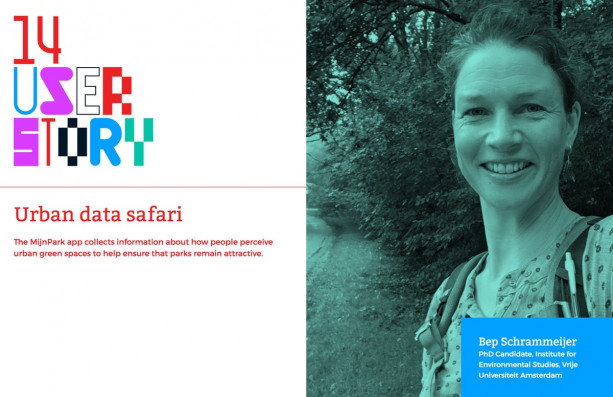Stay in the know on all smart updates of your favorite topics.
SHARE YOUR STORY AND MAKE AN IMPACT! Participants involving for documenting and mapping Chinese diasporic heritage in the Netherlands

Almost in every metropolitan city in the world exists a Chinatown where Chinese diasporic communities live and conduct commercial activities. In recent years, many countries have started listing and conserving Chinese diasporic heritage as their dynamic cultural resources that represent human migration histories and cultural diversity.
Chinese diasporic communities came to the Netherlands in the early 20th century. The Chinatown in Amsterdam is one of the main Chinatowns in the Netherlands, and is well-known in Europe. However, very few studies in the field of heritage management reveal and discuss the cultural significance (heritage attributes, values from various stakeholders) and management models.
We are researchers from the UNESCO chair in Heritage and Values, TU Delft. We are now looking for participants for a research project on Chinese diasporic heritage in the Netherlands, also called “共同保育我們的唐人街遺產” in Chinese. If you:
- come from a Chinese family with a migration background
- (used to) live in/work in/have emotional connections to Chinatown areas
- would like to share your stories/interests about Chinese diasporic heritage in the Dutch Context
......
Join us for this initiative for understanding, documenting and mapping the place where we all belong! You will be able to tell your own heritage, histories and stories, and encounter dynamic groups of heritage enthusiasts. Your participation will help us understand further the vibrant cultural legacy, which is valuable for keeping and telling future generations.
Feel free to fill in or share this participant form. We contact you and organize further activities (e.g. interview, focus group meeting, workshop, etc.) in the future.
For more information, you can also reach us through:
- Email: yan.zhou@tudelft.nl
- Tel: +31(0)647824405
- LinkedIn: https://www.linkedin.com/in/yan-zhou-45a79b290
_____________________________________________________________
Yan ZHOU (PhD researcher)
Dr. Ana PEREIRA RODERS (Professor)
Dr. Lidwine SPOORMANS (researcher & lecturer)
TU Delft – UNESCO Chair in Heritage and Values
Faculty of Architecture and the Built Environment
Cooperative challenge: How can we help to mainstream energy cooperatives and ensure that structures in society make room for them and barriers are resolved?
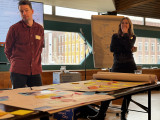
In the past decade, we have witnessed a surge of cooperatives across society. From community-led energy projects to endeavours in collective mobility and housing, citizens and companies are increasingly organizing themselves to shape their surroundings, often driven by sustainability and social goals and most of them do this in a not for profit way. Despite this rich history and the ongoing proliferation of initiatives, cooperative efforts and their benefits often remain small-scale and localized and, in most cases, accessible only to specific and select demographics.
This challenge aims to help civil society organizations in the energy domain, such as energy cooperatives, to become more mainstream. We aim to create recognition, to create an understanding of mutual interests with the key stakeholders they have to work with, and to exchange knowledge for these organizations to grow faster or repeat.
Professionals in romanian local public administration. Smart city managers
City Managers Association in Romania (AAPRO) was founded in 2010, as a follow-up of a pilot project called “Public Administrator – a success factor for an efficient management at local level” carry out by the Central Unit for the Public Administration Reform (a structure within the Romanian Ministry of Administration and Interior Affairs).
AAPRO is commited to form a national, relevant, elite and professional Body of City Managers, who must have a clear image on the background of this career and become responsible for their professional conduct and self-improvement.
The initiative to introduce the City manager position at each local level in Romania targets an higher lever of professionalism at counties, municipalities, cities and communes staff.
The romanian equivalent of the city manager can be hired upon the Mayor’s proposal or the one of the local council (wich must give the final aproval anyway), after a transparent selection process. His main responsibilities are to coordinate some of the public administration affairs and services (on an agreed agenda) and to do other specific tasks delegated by the Mayor / President of County Council, all of these concluded in a management contract, based on clear management objectives and performance criteria.
The City Manager is one common thing among the efficient and successful local governments
all over the world. Adopting him in the romanian administration was a step from public adminsitration to public management, focusing on delivery good qaulity services for the citizens. The Public Administrator, as we call it here, is not another birocrat, but a strategist, a visonary, balancing day-to-day (organizational) problem solving with planning and shaping the future, acording to the adopted local strategy and the community aspirations.
At the local level, the elected body and the technical staff, coordinated by the Mayor or the President of County Council and the Public Administrator, must first find aut and understand what people want, need and hope, then come up with a strategy, an action plan, seek for solutions, means and resources, involve the local actors such as bussines community and civil society, and communicate at any moment what has been done so far, and what is is comming.
In this picture, the City manager has a leading role, he is an communicator, technology facilitator, and can be, if the Mayor delegates him, even budget chief authorizing officer. Currently, in Romania activate more than 700 Public Administrators (the number varies from month to monyh), as follows :
- Out of 41 counties, 34 ocupied positions and 7 vacancies
- Out of 103 municipies, 56 ocupied positions and 37 vacancies
- Out of 216 cities, 60 ocupied positions and 65 vacancies
- Out of 2850 communes, 550 ocupied positions and 350 vacancies
Those above figures makes 459 vacancies in total, with the observation that, in many cases, we are talking about small comunes with scarce Romanian City Managers Association (AAPRO) conducted a survey among its members that identified the needs for training, building local capacities on climate protection, urban regeneration, structural changes and energy policies, concept of smart city and creatively intelligent communities.
Establishing appropriate training structures for the now and future City Managers is essential for supporting the development of the cities and climate strategies (it aims to encourage cities and municipalities to take concrete actions for climate protection in Romania), urban regeneration and structural changes, concept of smart city and creatively intelligent communities.
This project focuses on the competences that the city managers must have in order to achieve a multiplication effect through their contribution. The nationwide implementation of a systematic local energy management using the City Managers can thus make an important step to tapp existing saving potentials in different regions and to establish a sustainable portfolio management.
We hope that, with your support, that the outcomes of this important project, can be forwarded on an extended scale to the local institutions (schools, hospitals, etc) and communities, as good practices, improving the energy efficiency status and reducing the energy poverty, urban regeneration and structural changes, concept of smart city and creatively intelligent communities.
The pilot group will be composed of 50 to 80 city managers upon their self enrollment and applying few clear selection parameters : level of municipality, experience, english language, etc. The target group will be afterward authorized to further train other city managers and employees of the local municipalities. This core team is expected to disseminate the information and to act as an experts group in our Association.
As Romania has (at this moment) a deficit of at least 250 city managers, the learning and workshops center will be powerful tool, a public management academy and a testing facility for the ones applying for this position.
The Supportclub

Our idea: The Supportclub, let’s look after someone, as a team
The Supportclub makes volunteering for another person fun and easy to do. Our app carefully designs teams around a person in need, based on skills and fields of interests. Our network partners invites people that need a little help or company, informal care to make a profile as a supportee. Our campaign recruits people that want to help somebody, the supporters. They also make a profile.
The Supportclub app matches supporters based on their interests and skills. The app creates (temporary) teams around a supportee, e.g. Annie → Support team Annie. The Supportclub facilitates the teams to work together for Annie providing handy features like notification, a calendar, chat and monthly meet-up for the team.
The Supportclub proposition for supporters:
- look after a person that needs some help (18+)
- in a carefully designed team
- for a fixed period of time
- with social team activities
- facilitated by an app
Join the Supportclub!
The Support club proposition for supportees:
- Do you need some help or company?
- Register yourself at The Support Club and get a team. Three to five people that are willing to look after you. They do it together and make new friends while doing it.
- You let us know what your needs are and we do the rest.
Join the Supportclub!
Smart City Haarlemmermeer - Digital Society School project
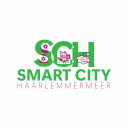
In large and diverse public organizations like the Gemeente Haarlemmermeer, communication can sometimes be hindered by silos. Different departments or teams in the organization may work independently leading to a lack of information sharing and coordination. With so many channels and platforms available, it can be difficult to filter out the information that is relevant and important to employees. This can lead to information overload and make it difficult for employees to stay updated on important updates.
Thus, the trainee team from the Digital Transformation Traineeship Programme at Digital Society School embarked on a challenge on how Gemeente Haarlemmermeer can be facilitated to become a smarter, more connected, transparent and digitally inclusive organisation.
Read more about the project on the website of Digital Society School!
Open Call: Create impact with the European CommuniCity project!

Does your organisation work with vulnerable target groups in Amsterdam, or are you a tech company with great ideas for digital solutions for this group? Create tech applications together for the challenges of vulnerable communities during the European CommuniCity project.
From 28 February to 31 March, you can submit your proposal for one of the challenges to CommuniCity for a chance to win a €12,500 grant to test your idea in practice.
How does it work?
- Companies or organisations submit their proposal via the CommuniCity website;
- The submissions are assessed against the set criteria and thus the winners are selected;
- The winning entries receive a grant of 12,500 euros to develop and test their solution together with the target group in Amsterdam.
For more information about the project, the challenges for Amsterdam and application conditions check the website below!
Research Interview on Digitalization and Big Data in City Administrations
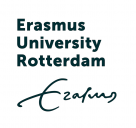
My name is Joe Calodich and I work as a researcher at Erasmus University Rotterdam in the research group Vital Cities and Citizens. I am currently looking for members of the city administrations in Amsterdam, Rotterdam, Prague, Tallinn, Vienna, Zurich, Brussels, or Munich who are interested in participating in a research interview.
The study which I am asking your participation for focuses on how large European cities have undertaken the digitalisation process of the public administration and how this process has affected the workings and the policies. I would also like to learn about some concrete examples on the use of big data related to this digitalisation process.
I hope to complete the interviews by the end of February 2023. Each interview will last between one hour and fifteen minutes and one hour and a half. The interview will be recorded and the content will be exclusively used for academic purposes (analysis, scientific publications, presentations, reports) and within the boundaries of the study’s goals. The gathered information will be treated by complying with anonymity and confidentiality criteria as defined in the social sciences regarding the use of personal information.
If you, or a colleague, is interested in participating, please send me an email at: 627583jc@eur.nl.
I look forward to hearing from some of you soon!
Responsible digitalisation challenge: How to make digital systems more human-centric?
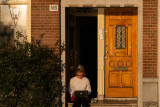
Technological and innovative developments are moving faster than ever before. As a government, you want and need to keep up with these developments. At the same time, the use of digitalisation and data often leads to undesired results, increasing the distance between citizens/entrepreneurs and the government.
The municipality of Haarlemmermeer is shifting her focus from 'the system is central, people have to become more digitally savvy to 'people are central, our systems have to become human-centric’. The underlying question is: how do you really put people at the centre of digitalisation and the design of digital systems?
Do you want to know more or contribute to this challenge? Contact me via sophie@amsterdamsmartcity.com or let me know via the comments below.
Project’s current phase
Jeroen Brink and Christine Groothuis from the municipality of Haarlemmermeer introduced this challenge to the Amsterdam Smart City network on the 7th of November, 2022. During a co-creation session, we discussed that there are two main elements of this complex challenge that we would like to focus on. On the one hand, we’re talking about a radical and fundamental shift. A different way of thinking within governmental institutions. This shift requires a more philosophical and substantive conversation about how we would like our digital public space and systems to look like. But on the other hand, we want to think big but also start small. Therefore, the municipality of Haarlemmermeer would like to embrace a real-life case to bring human-centred digital systems to life.
On the 1st of December, we organised a follow-up session with Amsterdam Smart City partners. During this session, Max Kortlander (Waag) presented the Public Stack. This project puts the public value at the centre to create open, democratic and sustainable digital public spaces. Following this introduction, we did a futures-thinking exercise led by Sacha van Tongeren (Kennisland), to think about how we want the digital public space to look like in the future. And additionally, we used empathy maps to synthesize our collective knowledge about our audience, which brought us closer to a common understanding of who they are.
User-Centered Public Engagement Toolkit

Open access toolkit of people-centered methods for urban planners, designers, and advocates to make cycling inclusive and accessible to all.
Local Inclusive Future Energy (LIFE) City platform

Amsterdam Zuidoost will build a large amount of new homes in the near future. This will will demand more capacity from the electricity network. With an increasing demand the energy network either needs investments to expand the capacity of the network, or we can explore smart solutions in the field of energy management.
LIFE City Platform
Together with the expected expansions of the network, smart management of energy at area level can help prepare Amsterdam Zuidoost for the future, without unnecessary investments in the current energy grid. The LIFE platform offers users the opportunity to make choices about energy exchange or storage based on economic motivation, sustainability or to support the energy grid. Futhermore, the project ensures that the energy that is generated in Amsterdam Zuidoost - and not immediately used - can be stored locally, such as in the Johan Cruijff ArenA battery.
'Ditgital twin'
An important part of the LIFE platform is the development of a “digital twin”. This digital twin is a digital representation of the ArenApoort area, in which the relevant buildings and energy infrastructure are simulated. All kinds of experiments and adjustments can then be carried out in this digital twin, such as adjustments to electricity prices and rates and the integration of more sustainable energy generation. This allows smart area-based energy to be exchanged after the optimal mix has been calculated using measurement data and artificial intelligence.
Want to know more about this electricity grid-friendly and community inclusive innovation to contribute to the energy transition? Visit our website>>
Observatory of ideas

Solidary, Creative Economy, for Communities and With Communities!
Thousands of other initiatives around the world!
(Ana Luíza Farage Silva)
At some point people realized that they needed each other to do something other than "subsist". From there, they decided to organize themselves in something called communities in order to improve their lives and practice a good "survival". Over time, they realized that the law of the strongest could hurt and decided to affirm social contracts to live together and in harmony.
Some people understood that they should give up some freedoms for this, others did not. Over time, these communities have been forming their stories, generating their identities and dynamizing their cultures. When communities became organized, they started to be called societies.
How many societies do we know? How many societies do we live in? Within these social contracts, many have little and few have a lot. Much what? Wealth? Yes, few have access! Access to quality education, decent health, respectful housing, nutritious food and so on.
How many can do what they want and how many cannot do what they need? It is in this concern that I perceive (as several others have already noted) that everything tends to come together. The better structured places attract bigger investments that generate bigger chains that attract even more investments and keep developing (or just growing) more and more. The point is that where there is little, little remains.
Does it have to be this way? If you were a government official and were going to choose to develop a state, would you give growth incentives to regions that are already more advanced or encourage the development of those that still have almost nothing? The prudent answer may be: "it depends" ... if you just want to develop faster, it may be easier to encourage the growth of the wealthiest regions.
After all, their chain is greater and they can “pull” other cities in the process of growth. But if you think about it on the other hand, you can see that there is no certainty that the poorest cities will be fostered by the richest. Will the access ever get there? With this in mind, several concepts and practices have been developed. Have you ever heard of Creative Economy? Basically, knowledge, creativity and intellectual capital are the production factors of this economy.
In this process, cultural production is used as a historical factor in the formation of identity and income generation in that community. In other words, a new look at the solution of the structural problems of society, the economy and culture are sought from the identity of that population.
In other words, development is sought from the convergence and respect for the roots of that people's history with cultural, social and economic objectives. Discussions, initiatives and studies have been taking place throughout Brazil with the aim of expanding this concept: the first International Forum of Creative Cities in Rio Quente took place in September 2013 http://rioquente.go.gov.br/cidades-criativas/, the IV Minas Gerais Meeting of Public Administration, Solidarity Economy and Social Management (IV EMAPEGS) addressed this theme in Viçosa this year http://www.emapegs.ufv.br/ and so on.
In addition, another concept has been addressed, created and practiced. Have you heard of Solidarity Economy? The concept of solidarity started to be guided at the end of the 18th century, but it has not yet been completely assimilated to the market. In this context, solidarity economy means interdependence and is based on the principles of cooperation, self-management and brings an economic dimension to society. In other words, we think of a market geared towards people, not people geared towards the market.
Despite the various difficulties faced by the Solidarity Economy, such as mapping, production flow, obtaining credit, advice and collective work, many advances and initiatives have taken place in Brazil. Have you heard of the Center for Solidarity Economy of Tocantis? UFT's NESOL? They have been working hard on this process: http://www.fapto.uft.edu.br/conhecimento/index.php/uft/14-nucleo-de-economia-solidaria-da-uft-nesol. Many communities have also realized that they live on the job, but remain in poverty. So they decided to challenge all the pre-established and create social currencies. That is, they realized that they had to develop some way to encourage the money to circulate more within the community itself, with the possibility of exchanging it for the real. Some initiatives have been implemented in Brazil. The first was Banco Palmas, at the Palmeiras complex in Fortaleza (CE). http://www.bancopalmas.org.br/oktiva.net/1235/nota/12291. Today there are more than 110 community banks, a chain, across Brazil. Several other initiatives in the world have been taken, but it is clear that challenges abound.
The 100 Intelligent Cities Challenge

The 100 Intelligent Cities Challenge (ICC) is a European Commission initiative that supports 136 cities in using cutting-edge technologies to lead the intelligent, green and socially responsible recovery. The ICC cities and their local ecosystems will be engines for the recovery of their local economy, create new jobs, and strengthen citizen participation and wellbeing.
The ICC is part of a wider EU support system that recognises the importance of delivering on the promises made by the European Green Deal, the digital strategy, and other EU policies. It looks to move towards a more digital, service-oriented and low-carbon economy, supported by a knowledge-based society, that enables circular economy systems through ‘local value loops’, evidence-based reskilling, and sustainable investments.
Participating cities receive one-to-one strategic advice from international experts on fine thematic strands: green economy and local green deals, improving the citizen participation and the digitalisation of public administration, green and digital transition in tourism, resilience of local supply chains, up- and reskilling of the workforce. ICC Cities are also supported by transversal services on access to data, access to finance and through a marketplace full of innovative solutions.
The Amsterdam Region, represented by Amsterdam Economic Board and Amsterdam Smart City (ASC) is one of the ICC mentor regions, alongside European mentor cities Aarhus, Antwerp, Barcelona, Espoo, Hamburg, Nice, Porto, Rijeka and international mentors Medellin, Singapore and Toronto. By participating in the ICC, the Amsterdam Region will share its experience and learn from other best practices related to multi-stakeholder collaboration, innovation ecosystems, circular economy and citizen participation.
ICC Updates:
• Launch of 100 Intelligent Cities Challenge
• ICC Challenge Mayors’ Summit
• Launch of ICC Renovation Action Group
• Public Kick-off 2nd ICC City Lab
• ICC - 3rd City Lab
• 200 Intelligent & Climate Neutral Cities Jam
• ICC - 4th City Lab
• Invitation to co-create European transition pathways for more resilient, greener and digital industrial ecosystems
• ICC - 5th City Lab
• Developing circular and sharing economy practices in cities
• The 100 Intelligent Cities Challenge: Looking Back & Looking Forward (End of Phase 1)
Wicked Problems
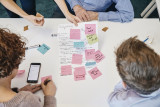
Te wicked? Niet voor ons.
Wij werken allemaal aan urgente, complexe, maatschappelijke uitdagingen. Issues die schier onoplosbaar lijken, van dilemma’s en paradoxen omgeven, nog niet duidelijk hoe het moet. Wel is duidelijk dát het moet, dat we elkaar nodig
hebben en dat we er NU aan moeten beginnen. Om met de woorden van Jan Rotmans te spreken; we leven niet in een tijdperk van verandering maar in een verandering van tijdperk. En hier hoort een nieuwe gereedschapskist bij.
En of je nou aan energietransitie werkt, andere mobiliteitssystemen, creëren van waterstofhubs, peer to peer autodeelsystemen, het maakt niet uit, we zien dat al deze opgaven op enig moment tegen gelijksoortige barrières aanlopen. Op samenwerking, financiering, privacy, onvoldoende aansluiting op de maatschappij, om maar een paar voorbeelden te noemen.
Unieke samenwerking
Als Amsterdam Smart City netwerk willen en kunnen we deze opgaven niet laten liggen. Door het bundelen van onze kennis en expertise kunnen we als netwerk iets unieks bieden en de wil en durf tonen om deze barrières te doorbreken. De betrokken partners die dit uitdenken en begeleiden zijn RHDHV, Kennisland, Drift, NEMO, Arcadis, Alliander, HvA en Metabolic. Zij bundelen hun expertise en ervaring om de echte vragen boven tafel te krijgen, tot nieuwe manieren van samenwerken te komen en barrières te doorbreken. We richten ons met name op de start van de samenwerking. Gezamenlijk ontwikkelen we een ‘wicked problem aanpak’. Op een nieuwe manier, lerend door te doen, exploratief.
Waar moet je aan denken?
Wat is eigenlijk het echte probleem? Wiens probleem is dit? Hoe kijken anderen er tegenaan? Welke andere partijen lijken nodig? Hoe vind je ze? Hoe ga je om met eigenaarschap en botsende frames? Hoe zorg je dat je al in
een vroeg stadium de maatschappij (bewoners, ondernemers, werknemers, etc) betrekt en hun ervaringen in het project trekt? Het wicked problem team zet nieuwe methoden in voor het beantwoorden van deze vragen. En het creëren van de benodigde commitment om het vraagstuk aan te pakken. Niets staat van te voren vast, want we passen ons aan aan wat we tegenkomen. Met elkaar ontwikkelen we een nieuwe aanpak om de barrières te doorbreken.
Isolde de Ridder Sieraden
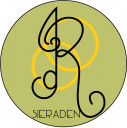
At Isolde de Ridder Sieraden, founded by Isolde de Ridder – Le Creurer in 2017, creating high-end jewellery with the greatest of care for both people and planet, is our mission. We strive to make the world more beautiful with our unique jewellery. Our unique pieces are crafted by hand in the Netherlands. Jewellery that give discarded metals and other materials a second life and that contribute to a better world for generations to come.
Transition from Smart to Inclusive city

The primary objective of this research project is to enhance an understanding of the concept of inclusion and its criteria in Smart city discourse. The research ambition is applying the result as a tool for benchmarking inclusive smart cities, which can assess and improve them. To apply the result, we aim to work with cities like Amsterdam, The Hauge, and Rotterdam.
De KasKantine
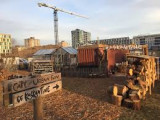
The KasKantine is a small, transportable, ecovillage in the city, currently buildin up on its fourth location in the West of Amsterdam, completely made with DoItYourSelf technology and mostly with natural and waste materials. Still it has hold a liquor permit and a restaurant that can host up to 150 guests. Furthermore a mobile aquaponic system, rain water filter and waste water filter, 30 solar panels and 13 shipping containers accommodating social initiatives and ecological entrepreneurs.
Nature4Cities

Nature4Cities is a H2020 EU-funded project, creating a comprehensive reference Platform for Nature Based Solutions (NBS), offering technical solutions, methods and tools to empower urban planning decision making. This will help addressing the contemporary environmental, social and economic challenges that face European Cities.
We will bring Nature back into innovation, planning and their implementation. This new governance implies new collaborative models driven by citizens, researchers, policy makers, and industry leaders, utilizing co-creation processes and sharing of Best Practice. Thus, the goal for implementation Projects is a positive balance between economic, environmental and societal benefits and costs.
Snap de Brief ("help me read")

We created a service that helps out with debt and difficult letters to help their financial situation.
About Tiltshift: https://www.tiltshift.nl/
Onderzoeksproject Catalyst
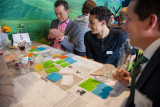
Voor dit onderzoeksproject zijn we nieuwsgierig hoe kunst kan helpen om bewoners en andere stadsgebruikers een mening te laten vormen over de slimme stad.
We doen dat in drie rondes, waarbij we steeds meer de diepte ingaan:
* De eerste ronde vindt plaats op straat; voorbijgangers worden geprikkeld om over de slimme stad na te denken door middel van kunstinstallaties en onzichtbaar theater.
* Ronde twee vindt plaats in buurthuizen; bewoners en andere stadsgebruikers worden gestimuleerd om een mening te vormen over de slimme stad.
* Ronde drie vindt plaats bij het NEMO Science Museum en brengt bewoners in gesprek met slimme stadsmakers, zoals technologieontwikkelaars en beleidsmakers.
Daarbij hebben we steeds drie vragen:
* In hoeverre helpen de kunstinstallaties en theaterstukjes om de slimme stad relevant te maken voor deelnemers? Wanneer ervaren deelnemers het als leuk en belangrijk om een mening te vormen over de slimme stad?
* In hoeverre helpen de kunstinstallaties en theaterstukjes deelnemers om de verbeelding te stimuleren? De slimme stad is voor veel mensen een abstract begrip. Hoe kan kunst helpen om de slimme stad tastbaar en bespreekbaar te maken?
* In hoeverre helpen de kunstinstallaties en theaterstukjes deelnemers om gefundeerde mening te vormen over de slimme stad? wat helpt deelnemers om niet alleen een mening te vormen, maar ook van zichzelf te begrijpen waar deze mening vandaan komt?
We onderzoeken deze vragen op een kwalitatieve manier, namelijk door middel van observaties en interviews. De publieksactiviteiten vinden plaats in Amsterdam tussen september 2018 en januari 2019.
Crowdsensing Rembrandtpark
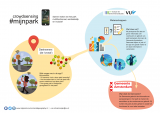
Urban green is good for your health. Urban green is good for social cohesion and Amsterdam’s city parks are being used more and more intensively. It is the City of Amsterdam’s responsibility to ensure that the parks remain attractive for everyone, but how? The Institute for Environmental Studies (IVM) at the VU is working together with the Gemeente Amsterdam on an app that collects information about how people perceive and use urban green spaces. A pilot is being conducted in the Rembrandtpark to see how such information can inform park renovations.
An example of the first results may look like this:
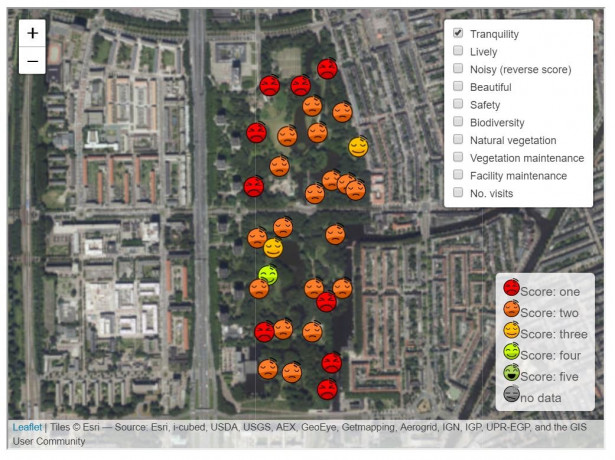
Are you visiting the Rembrandtpark? Go to http://mijnpark.environmentalgeography.nl/ to join!
Smart Stories
Check the article about MijnPark featured in our online magazine 'Smart Stories':
Stay up to date
Get notified about new updates, opportunities or events that match your interests.
